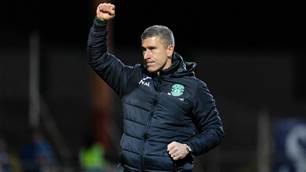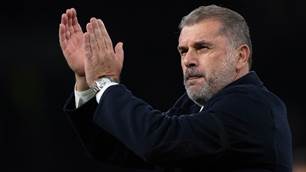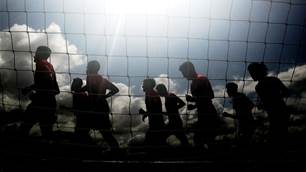Sitting in front of a darkened background at the City Football Group headquarters in Manchester, brandishing a designer windcheater adorned with the letters BOSS, Ange Postecoglou gives away little more than he ever has.
He’s become a divisive figure in Australian sport, and while the hair is a little greyer and the beard a little longer, his mannerisms retain perfectly intact: He owes no explanations, he’s just here to play his football.
“After finishing with the national team there was no set plan,” Postecoglou began. “I was willing to be patient, but this happened pretty quickly.
“It’s a difficult one to explain – plenty of people have wanted one silver bullet as an answer. It’s just me,” he repeated.
“I felt like in four years I got the team to where I wanted them to be. After assessing the possibilities of what (Yokohama) can achieve, it was really appealing.
“The smarter move would have been to have the next step planned, but I took a leap of faith.”

Calculated risks are the Postecoglou ethos. Leaving the Australian football landscape in acrimonious circumstances – just before the assumed pinnacle of his footballing journey – left a sour taste for fans and media alike.
But there is a sense that Postecoglou is in the right place at Yokohama. It’s a club that, due to its association with the City Football Group, is part of bigger, better things. Japanese football prides itself on its hard-work, technical excellence, and the Joga Bonito principles it wholeheartedly adopted from the Brazilians.
“I’ve travelled through Japan and played against Japanese players, and in terms of how we want to play our football, there are some really exciting possibilities there,” Postecoglou said.
“The J-League standard is strong and (Yokohama) haven’t won anything for a while. As a manager, they’re the sort of things that excite you.
“I spoke to representatives of Yokohama and it seemed like a good fit, and after a couple of chats it happened pretty quickly.”
While, to an extent, Postecoglou’s surliness remains – he’s never made any apologies for his lack of ‘cuddliness’ – he realises he may be perfectly suited to Japanese football, and his chosen club.
“It’s unchartered territory in a global sense, what (the City Football Group) is trying to achieve. Having spent some time here, there are major advantages – the more detailed work that’s done here, that in club football is (usually) impossible because it’s week to week.
“Having a body that’s looking back on a broad sense to give information to you…is just a tremendous advantage.
“The advantage is that I’m starting in pre-season, I can explain to the players the journey we’re going to head off on. There’s not a great deal of work to be done in terms of bringing in new players. The main thing is explaining the kind of football we want to play.

“We want to be aggressive, even in the way we defend. My job is to get the players to believe in the football we want to play.
“I’ve had success so far playing in that way. I haven’t set targets because they’re almost limitations; I always start on the basis that I want my teams to play a certain way.”
While Ange is nothing if not reserved, behind the seemingly impenetrable tone, his words contain every reason for Yokohama fans to be excited.
The Marinos have a prodigious academy and proud traditions, yet haven’t won the J-League since 2004. It’s a privileged setup reaching all the way from Melbourne to Manchester, but the Yokohama piece of the puzzle is low on inspiration, and begging for rejuvenation.
In Postecoglou, it may just have the understated visionary it requires. For all their money, the City Football Group are footballing ideologues themselves.
“The main goal is that when people watch Yokohama play in the first game, they’ll see we want to dominate opposition and be exciting,” Postecoglou said.
“(The facilities here) are ground-breaking. You get the feeling that something bigger than just another football club is being built here.
“If you love football, and you’re the kind of person that’s curious about what’s next, it’s what the future of football might look like.
“You kind of walk away with the ambition to create something similar on your own piece of turf.”
As for Ange himself, perhaps his chequered Australian legacy is just a minor component, in a much bigger picture.
“I keep pushing the boundaries and see where it takes me,” he said.
“The ultimate ambition is to keep looking for the perfect game, and knowing that doesn’t exist, I’ll just keep going until I’m finished.”
Related Articles

Champion A-League coach set to join Premier League giants

Under the gun: Spurs fans want Ange to be a loser in night of spite













